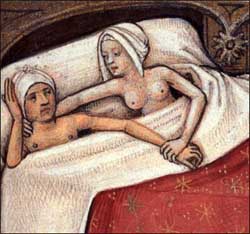|
|
|
|


Bodleian Ms. Douce 195, f. 118
WOMEN.
[Lambeth MS. 306, leaf 135.]
Women, women, loue of women,
Make bare purs1 with some men,
Some be nyse as a nonne hene,2
Yit al thei be nat soo.
some be lewde,
some all be schrewde;
Go schrewes wher thei goo.
Sum be nyse, and some be fonde,3
And some be tame, y vndirstonde,
And some can take brede of a manes hande,
Yit all thei be nat soo.
some be lewde,
some all be schrewde;
Go schrewes wher thei goo.
Some cane part with-outen hire,4
And some make bate in eueri chire,5
And some cheke mate with oure Sire6,
Yet all thei be nat so.
Some be lewde,
and sume be schreuede,
go wher thei goo.
Som be browne, and some be whit,
And some be tender as a tripe,
And some of theym be chiry ripe,7
Yet all thei be not soo.
Sume be lewde,
and some be schrewede,
go wher thei goo.
Some of them be treue of love8
Beneth the gerdell, but nat above,9
And in a hode aboue can chove,10
Yet all thei do nat soo.
Some be lewde,
and some be schreude,
go where thei goo.
Some cane whister11, & some cane crie,
Some cane flater, and some can lye,
And some cane sette the moke awrie,12
Yet all thei do nat soo.
Sume be lewde,
and sume be schreuede,
go where thei goo.
He that made this songe full good,
Came of the north and of sothern blode,
And some-what kyne to Robyn Hode,13
Yit all we be nat soo.
Some be lewde,
and some be schrewede,
go where thei goo.
Some be lewde, some be schrwde,
Go where thei goo.
|
1 Make bare purs, i.e. clean out a man's purse.
2 nyse as a nonne hene, i.e. nice (prudish) as a nun's hen.
3 fonde, foolish, or in this case, easy.
4 Some...hire, some will part with their goods, i.e. "put out," without getting paid.
5 make bate...chire, bait men in every shire.
6 cheke...Sire, some are "checkmating", i.e., "doing" our lord.
7 chiry ripe, red as a ripe cherry; also, ripe for "plucking."
8 treue of love, faithful.
9 Beneth...above, below the skirt, but not above it.
10 hode...chove; "Hode" has a very specific definition
in the MED, and stands for rank; "chove" = "shove."
I will quote a medievalist friend of mine, who goes under
the pseudonym of "Dr. Virago", and who explained it to me thus:

"The whole stanza is punning — she's faithful
"below the girdle" means both the literal sense, at
least at first (she doesn't have sex with other men),
but then comes to mean she doesn't cheat with men of
her station or lower, but is able and willing to "in
a rank above." The whole thing relies on the metaphor
of the body politic — where lower ranks equal
the lower regions of the body."

11 whister, whistle.
12 sette... awrie, set a mock (joke, jest) awry; i.e., "the joke's on you, buddy."
13 kyne to Robyn Hode, kin, or akin, to Robin Hood. It is to be remembered
that the medieval idea of Robin Hood is little like our modern,
noble conception. In the Middle Ages, the gestes and ballads
of Robin Hood were bawdy tales in which Maid Marian was not
much short of a harlot; so, what the songster is saying is that he's
like the writer of those bawdy tales of debauchery.
|
 | to Middle English Lyrics |
 | to Luminarium Main |
 | to Middle English Literature |
Site copyright ©1996-2018 Anniina Jokinen. All Rights Reserved.
Created by Anniina Jokinen on November 26, 2006. Last updated November 21, 2018.
|
|
Middle English Literature
Geoffrey Chaucer
John Gower
Sir Gawain and the Green Knight
William Langland / Piers Plowman
Julian of Norwich
Margery Kempe
Thomas Malory / Morte D'Arthur
John Lydgate
Thomas Hoccleve
Paston Letters
Everyman
Medieval Plays
Middle English Lyrics
Essays and Articles
Sciences
Medieval Cosmology
Historical Events and Persons
Hundred Years' War (1337-1453)
Edward III
Edward, Black Prince of Wales
Lionel of Antwerp, Duke of Clarence
John of Gaunt, Duke of Lancaster
Edmund of Langley, Duke of York
Thomas of Woodstock, Gloucester
Richard of York, E. of Cambridge
Richard II
Henry IV
Edward, Duke of York
Henry V
Thomas, Duke of Clarence
John, Duke of Bedford
Humphrey, Duke of Gloucester
Catherine of Valois
Charles VII, King of France
Joan of Arc
Louis XI, King of France
Charles the Bold, Duke of Burgundy
The Wars of the Roses (1455-1485)
Causes of the Wars of the Roses
The House of Lancaster
The House of York
The House of Beaufort
The House of Neville
Henry VI
Margaret of Anjou
Richard Plantagenet, Duke of York
Edward IV
Elizabeth Woodville
Edward V
Richard III
George, Duke of Clarence
More at Encyclopedia and at
Additional Medieval Sources
|
|